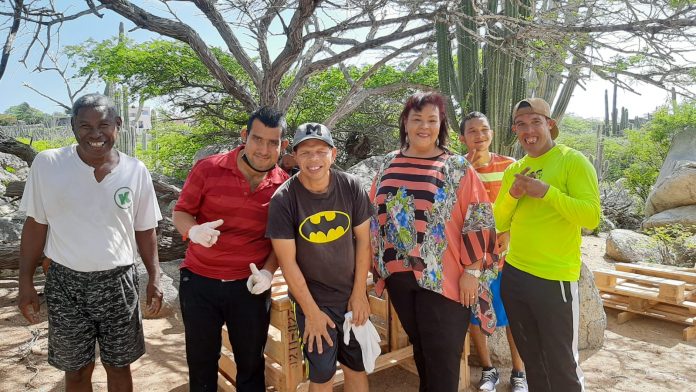Centro Man na Obra every day is focused on people with intellectual disabilities, so that they can advance in their lives and also achieve more inclusion in their communities, by teaching them about the labor market so that they can feel they can achieve more.
Cince 1985, Centro Man na Obra is a department for adults of the Foundation for People with Intellectual Disabilities (SVGA for its name in Dutch), which is tasked mainly with giving its clients the time so they can learn aspects of a job, and this way, maybe some of them can get a permanent job in the labor market.
Elvira Tromp, who works as head of Centro Man na Obra, says that while she knows that not all her clients will manage to get a job, for those who don’t manage to get an independent job they still want to show the client, their family and the entire community how even having an intellectual disability they can learn to do a job.
Centro Man na Obra has capacity for 75 clients 16 years old and up, from various nationalities including Aruban. They don’t have a maximum age because as long as the client can participate with their goals, the client can come. Currently, according to Tromp they have 73 clients. There was a time when they had more than 75 clients, because they also have some clients come part-time; but that depends on the client’s age and their oldest client is 83 years old.
Tromp says that they have different work groups, and then clients themselves can choose in which group they want to work. “If over time we see that they keep choosing a job that is not for them, we guide them to go in another direction. It’s the same as with other young people, when they choose a study that is not right for them, over time they grow frustrated. Here it’s the same. They can choose which group they can go to learn a skill”, she says.
Currently the foundation is a bit short-staffed, having only ten workers, and they have to run the entire department. “This means we don’t have all the possibilities for the clients to get a job or to learn how to do a job”, Tromp said.
Of the group who learns a skill, they specialize in the area of gardening, car wash, carpentry, candle making, painting objects or painting on canvas; groups who go do work outside and groups who pack products for a local company at the department’s building.
“These 10 workers do all this. We have a schedule for them, where this is the program we provide and not every group works every day. Because we only have ten people, we must try to bring variety to the clients. It’s the same as how school has a schedule, we also have a schedule that a certain group works a certain day”, Tromp explains.
As a department, they see an improvement in the reception in the labor market compared to years ago. They have four local companies who opened their doors for the clients of Centro Man na Obra can work in the company, and also send work to the department where the clients can complete it. There’s also the possibility for the clients who can achieve more can do an internship at the company.
Even so, Tromp highlights that local companies could be a little bit more flexible in order to offer people with intellectual disabilities an opportunity to progress further in their lives.
Regarding the quality of life of their clients, Tromp says that this starts at home, with acceptance from the family. Aside from acceptance they also need the possibility to eliminate some of the overprotection, where there are families that see that there are options for the client, but they are afraid of letting them try. There are of course also benefits for the employer.
“Incentives, that if they take in a worker with an intellectual disability they could maybe get a reduction in taxes or pay less for imports, for example, to make them also more attractive. It’s true that sometimes people think that by taking our clients as workers there can be a deficiency at work, but this doesn’t have to mean that productivity goes down. You can adjust the workload to the person”, Tromp emphasizes.
For a person with intellectual disability it’s easier when the work is structured, if every day the work is the same, they learn it faster and they won’t have a problem to get used to it, according to Tromp.
Tromp, who has 32 years of experience in this field, says that in all those years she placed many clients at work who are still working; and others who go back home or back to the department, because there was a change in the structure of the work that they were doing.
There is a lack of awareness in the community. Tromp expressed that they try to provide this also. There are companies which themselves ask for the clients to come do an internship, and here the department goes and gives a talk and guidance to the workers on how to work with the clients and what they need to be aware of when dealing with a person with an intellectual disability.
Regarding education, Tromp explained that the challenge for people with intellectual disabilities is that there’s only basic schooling available for them. There are some special schools but these are private, and not all the parents have the means to pay for such a school. This is the reason that Tromp and the department have asked the government of Aruba to come up with advanced special education, where every student who completes Dun’un Man at 16 years old can still receive an education until they are 20 years old, so that their clients can be more mature.
Finalizing, Tromp said it would be good if companies which have the need for workers think about people with intellectual disabilities, to give them a chance.
If any company wishes to get some help at work from one of their clients, like packing or pricing items, the center is open for this.

















